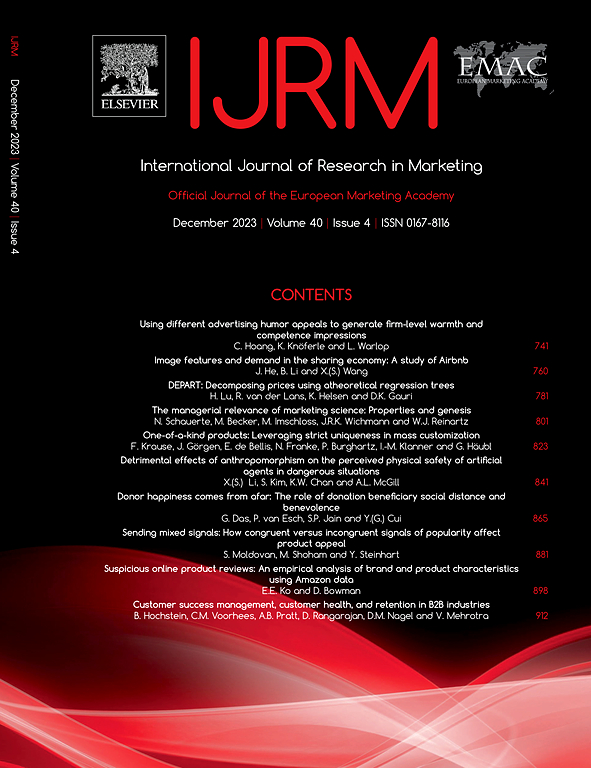哦!对不起,我的错:为直接电子邮件活动中的小错误道歉如何带来积极的客户评价
IF 7.5
2区 管理学
Q1 BUSINESS
International Journal of Research in Marketing
Pub Date : 2025-09-01
DOI:10.1016/j.ijresmar.2024.11.004
引用次数: 0
摘要
许多公司不愿为微不足道的错误向客户道歉,因为这些错误往往不被注意到,而且看起来微不足道,不值得道歉。然而,一些公司已经采取了通过电子邮件向大部分客户道歉的做法,不管客户是否直接受到错误的影响。本研究探讨了在直接电子邮件营销中,承认这些微不足道的错误并为此道歉是否能成为一种有效的说服策略。首先,一项基于真实数据的实地实验证明了为微不足道的错误道歉的有益影响。三个(实验室和在线)实验表明:(1)为微不足道的错误道歉对客户对公司的评价有积极影响;(2)公司感知温暖的增加解释了这种影响,而感知能力的相应下降不存在;(3)当道歉来自一个被认为是高度温暖的公司时,正向效应消失。最后,本研究总结了理论和实践意义的讨论,承认了未来研究的某些局限性和途径。本文章由计算机程序翻译,如有差异,请以英文原文为准。
Oops! Sorry, my bad: How apologizing for trivial mistakes in direct email campaigns leads to positive customer evaluations
Many companies are reluctant to apologize to their customers for trivial mistakes, which often go unnoticed and may seem too minor to warrant an apology. However, some companies have adopted the practice of apologizing for trivial mistakes via email to a large portion of their customer base, regardless of whether customers were directly affected by the mistake or not. This study explores whether acknowledging, and apologizing for, such trivial mistakes can be an effective persuasion tactic in direct email marketing. First, a field experiment that relies on real-life data demonstrates the beneficial impact of apologizing for trivial mistakes. Three (lab and online) experiments show that (1) apologizing for trivial mistakes positively affects customer evaluations of the company; (2) an increase in the company’s perceived warmth explains this impact, while a concomitant decrease in perceived competence is absent; and (3) the positive effect disappears when the apology stems from a company that is already perceived as high in warmth. Finally, the study concludes with a discussion of theoretical and practical implications, acknowledging certain limitations and avenues for future research.
求助全文
通过发布文献求助,成功后即可免费获取论文全文。
去求助
来源期刊
CiteScore
11.80
自引率
4.30%
发文量
77
审稿时长
66 days
期刊介绍:
The International Journal of Research in Marketing is an international, double-blind peer-reviewed journal for marketing academics and practitioners. Building on a great tradition of global marketing scholarship, IJRM aims to contribute substantially to the field of marketing research by providing a high-quality medium for the dissemination of new marketing knowledge and methods. Among IJRM targeted audience are marketing scholars, practitioners (e.g., marketing research and consulting professionals) and other interested groups and individuals.

 求助内容:
求助内容: 应助结果提醒方式:
应助结果提醒方式:


